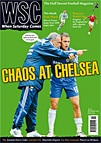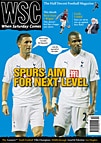 Dear WSC
Dear WSC
Oh blast, nearly made it, Huw Richards (Reviews, WSC 248). Six paragraphs of something approaching even-handedness towards Leeds United in your review of Gary Sprake’s biography but then, with the finishing line in sight, you can soar above the gravity of glib public opinion no more: “They were indeed dirty, cheating bastards.”It’s not that I’m a Leeds fan, nor that I unreservedly dispute these allegations. I was in my naive early teens when Revie’s men were in their pomp, so I could easily have been oblivious to the more devious methods of what was still one of the most effective teams I’ve ever seen. If they are to be criticised 30 years on, however, then can it at least be in a manner consistent with modern times? Consider one Roy Keane, for example. Occasional thug, habitual hothead, a cynical intimidator who went after what he wanted regardless of whether it did more harm than good to those around him. How many times have you witnessed a debate on the Irishman kick off with one of these themes, only to undergo a remarkable transformation as your local Keane apologist enters? By the time he has stressed Keane’s honesty, perfectionism and dedication, you’re being invited to believe that Sunderland’s gain was the Vatican’s loss. Whatever side of the argument you take, its structure certainly works to Keane’s advantage. Get the Mr Hyde stuff out of the way first, then finish the discussion on a high, firmly focused on Dr Jekyll. And if it’s good enough for Roy, it’s good enough for Leeds United. So next time your writers are let loose on the Elland Road archives, can we have a gentlemen’s agreement that they get the whole snidey, paranoid, Machiavellian thing out of the way early on and then close with two simple points: that Revie’s team were one of the best passing and possession sides this country has ever produced and that anyone who thinks you can merely cheat your way to two League titles, League and FA Cups, plus two European trophies from five finals, wants their head examining?
Jeffrey Prest, via email
Search: ' Spain'
Stories
 José Mourinho has unexpectedly returned home – to make headlines, if not to work. Phil Town describes how Portugal has been coping
José Mourinho has unexpectedly returned home – to make headlines, if not to work. Phil Town describes how Portugal has been coping
Once the natural incredulity at “the best coach in the world” being removed from office had passed, the Portuguese press and public shifted promptly to what really mattered: the dosh involved. Mourinho gets €24 million trumpeted sports daily A Bola. €26 million to keep quiet reckoned O Jogo. Filthy rich blared Record, trumping its rivals with €30m (£21m). Weekly magazine Sábado thought it had the right figure: “€25 million… less tax”. “Mourinho has shown that he’s number one on and off the field… even at getting compensation,” jested Benfica coach José António Camacho. Sábado had a graphic showing the rise and rise of Mourinho’s income over the years, starting in 1978 with the 500 escudos (€2.5) he would earn from writing reports on opponents for his dad, a goalkeeper with Vitória de Setúbal, and ending with the €7.5m a year he was being paid by Chelsea.
 Jon Spurling reports on Michel Platini's ambitious plans
Jon Spurling reports on Michel Platini's ambitious plans
“Football is a game before a product, a sport before a market, a show before a business,” said Michel Platini in January. The new UEFA chairman has since claimed that all his proposals – including his suggestion in August to cut the number of Champions League places allocated to Europe’s leading leagues from four to three and his aim that European finals be played on a Saturday afternoon with 75 per cent of allocated tickets going to the finalists’ supporters – are based on “sporting philosophy and not anything financial”. Others don’t share Platini’s altruistic vision.
 Villa and Ipswich battle it out for the title. By Josh Widdicombe
Villa and Ipswich battle it out for the title. By Josh Widdicombe
The long-term significance
The new decade brought the first signs of a new England team. West Brom captain Bryan Robson made his international debut, becoming Captain Marvel for club and country for a decade before taking to management like a duck to oil. Terry Butcher also established himself at the centre of the England defence, becoming the youngest England player at Spain 1982. Gary Lineker made his first appearance in the top flight for Leicester, often playing out wide, while Chris Waddle, Peter Beardsley and Mark Wright were also starting out. After this campaign the rule of three points for a win was introduced, replacing the system that had operated since the Football League’s formation in 1888-89.
 Ciudad de Murcia have been taken over and relocated in the manner of Wimbledon moving to Buckinghamshire – while their fans have been ignored, writes Phil Ball
Ciudad de Murcia have been taken over and relocated in the manner of Wimbledon moving to Buckinghamshire – while their fans have been ignored, writes Phil Ball
When I was a kid, a mate nicked a bike that was propped up on a lamp-post. I asked him why and he replied: “It’s not tied up. It’s mad not to nick it.” It was a brutal sort of logic, but I shrugged and let him get on with it. I’d forgotten about the incident till this summer, when Carlos Marsá, a 57-year-old industrialist from Granada, bought the shares, footballing rights and contracts of Spanish second-division club Ciudad de Murcia, and changed them into his own Granada 74, thereby effecting an MK Dons-like take-over – or, more prosaically, nicking the bike. Needless to say, as with Wimbledon, various bodies, among them UEFA, have shrugged their shoulders and let him get on with it.